Diary of Trooper Ion Llewellyn Idriess-1915-Part 2
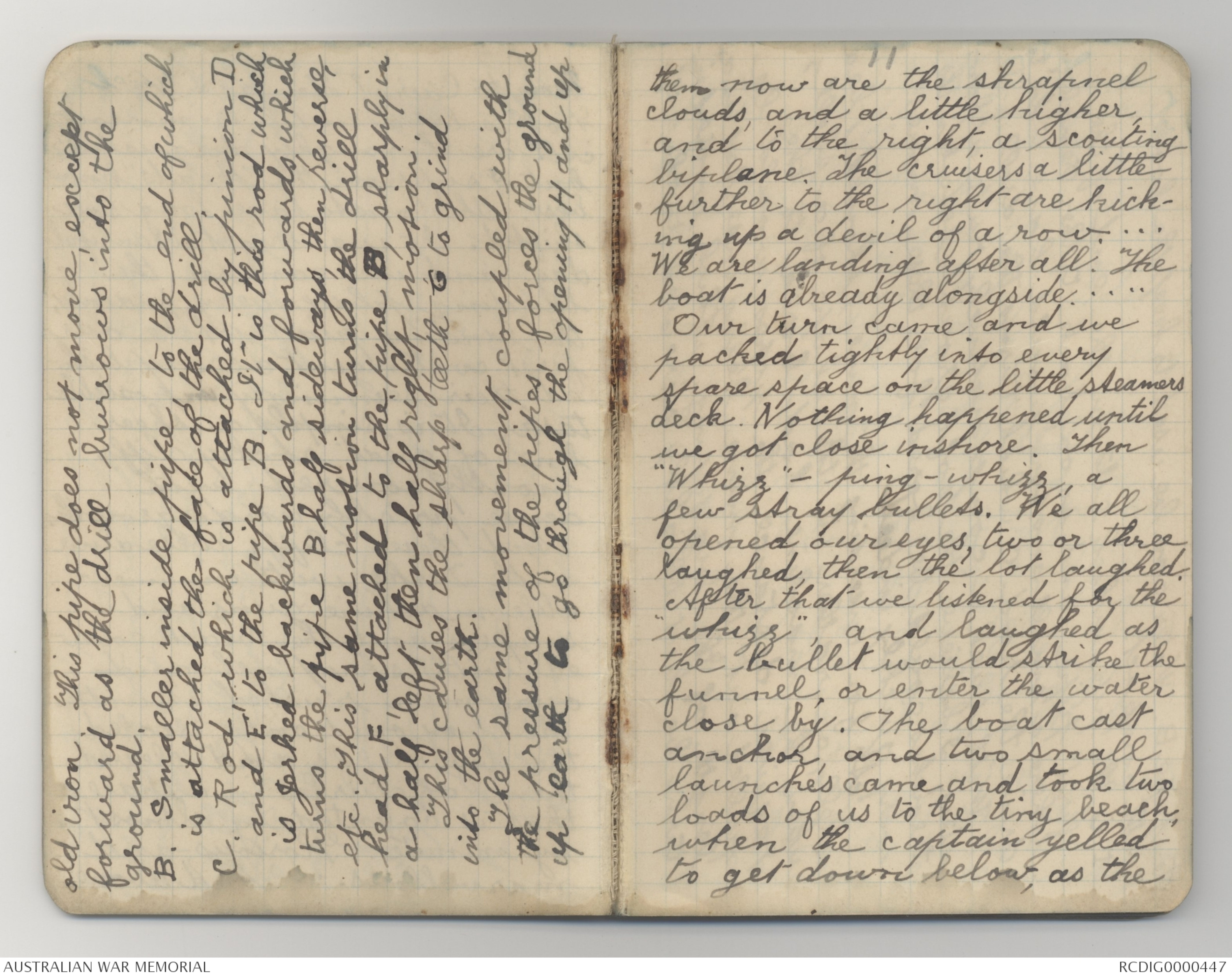
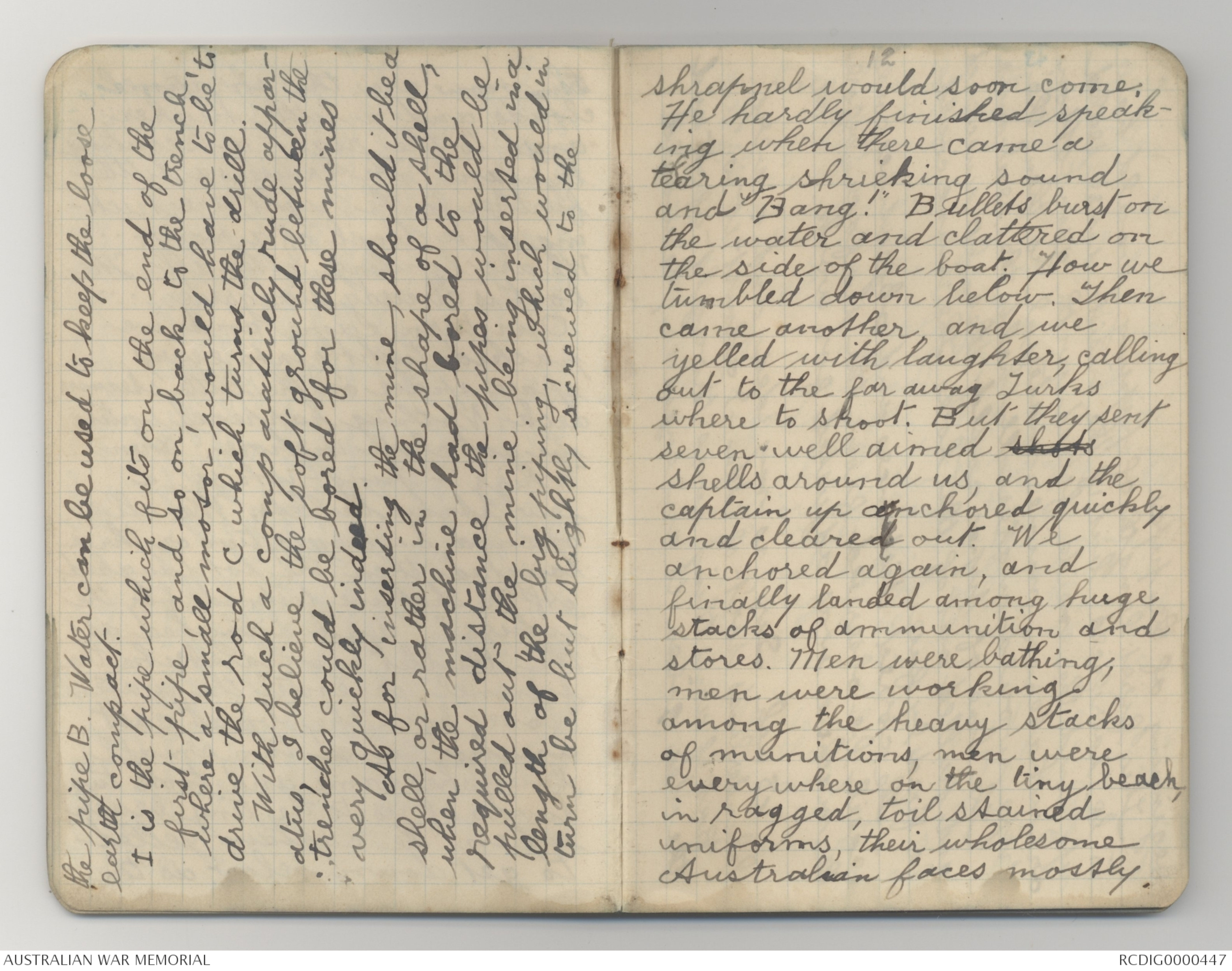
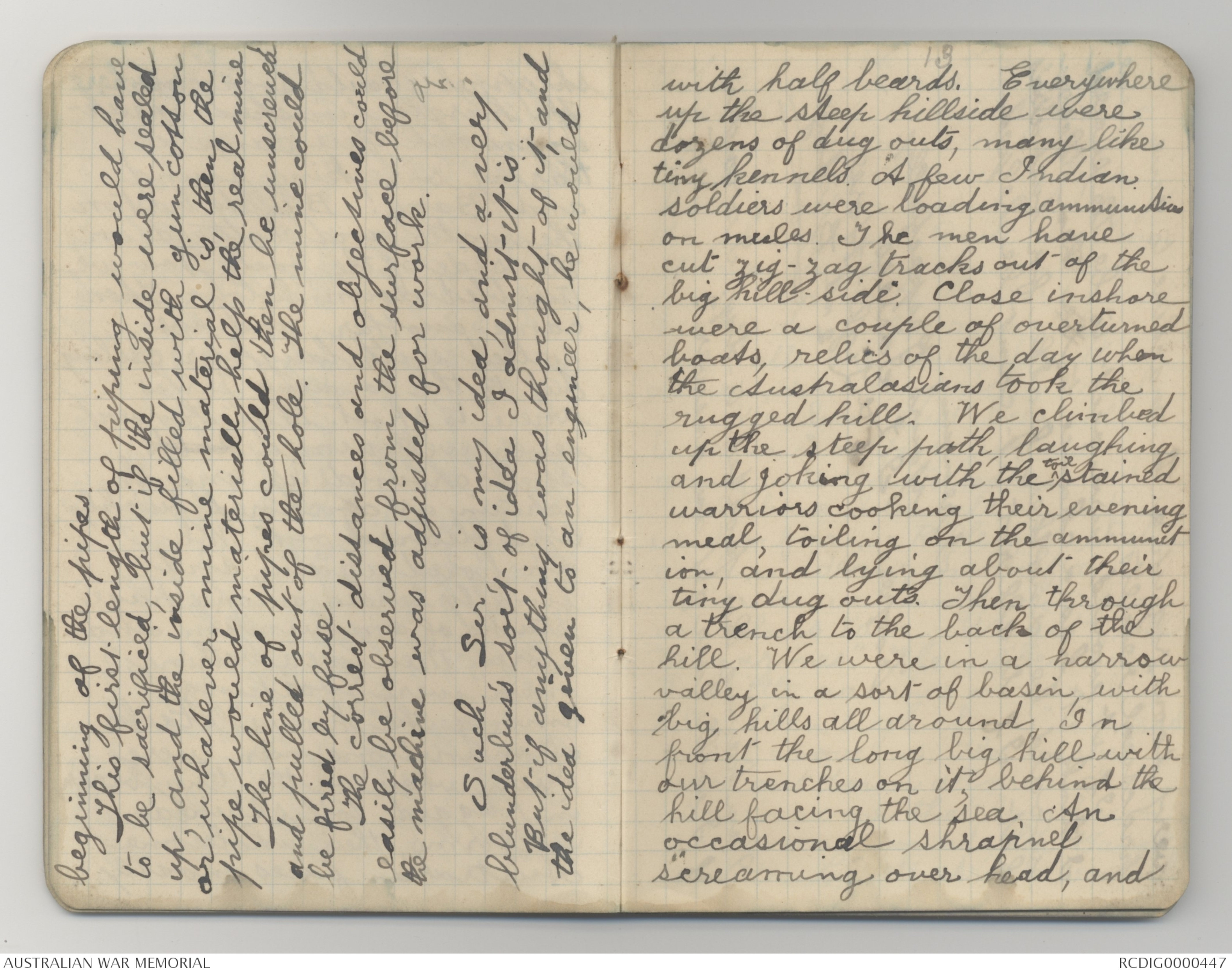
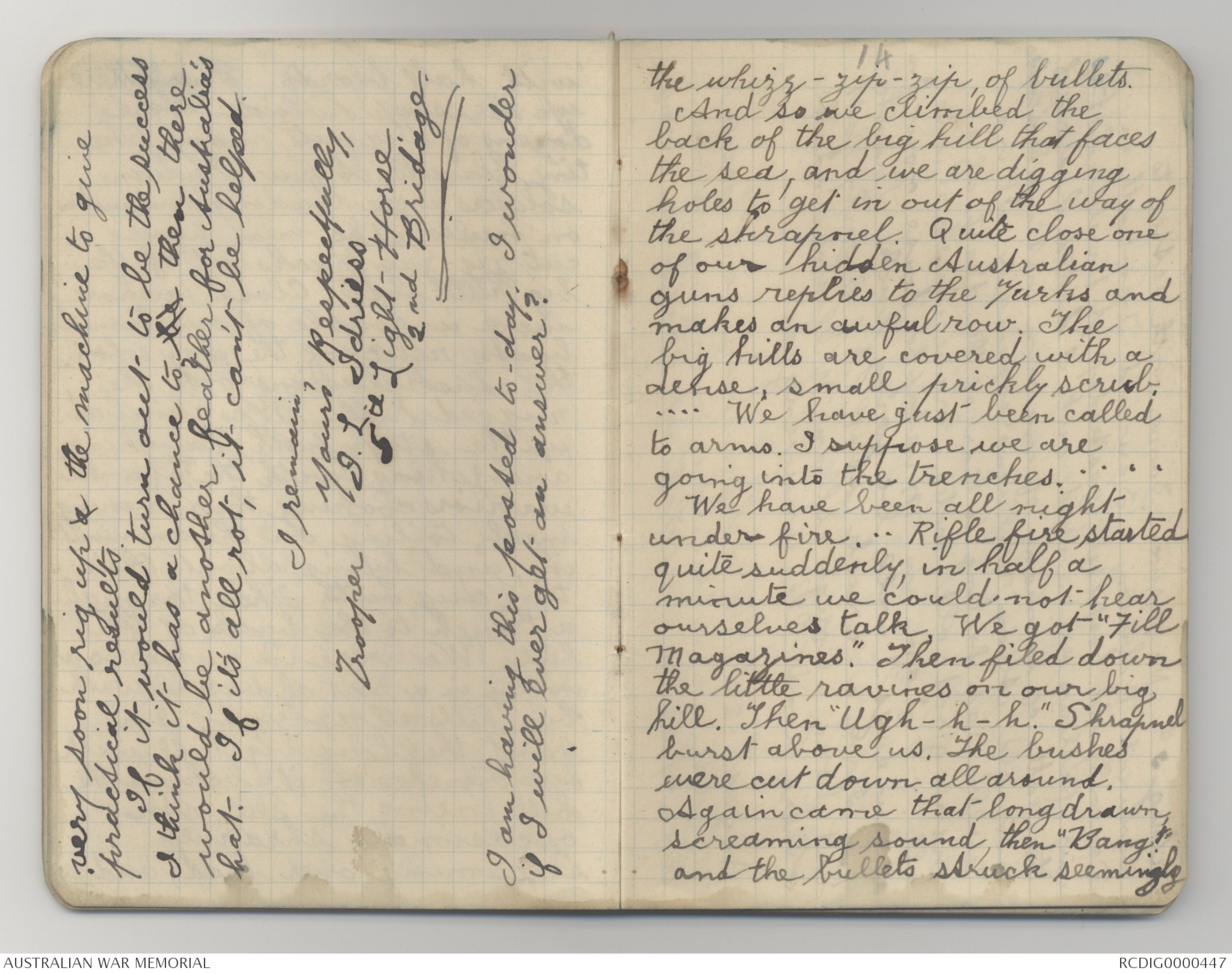
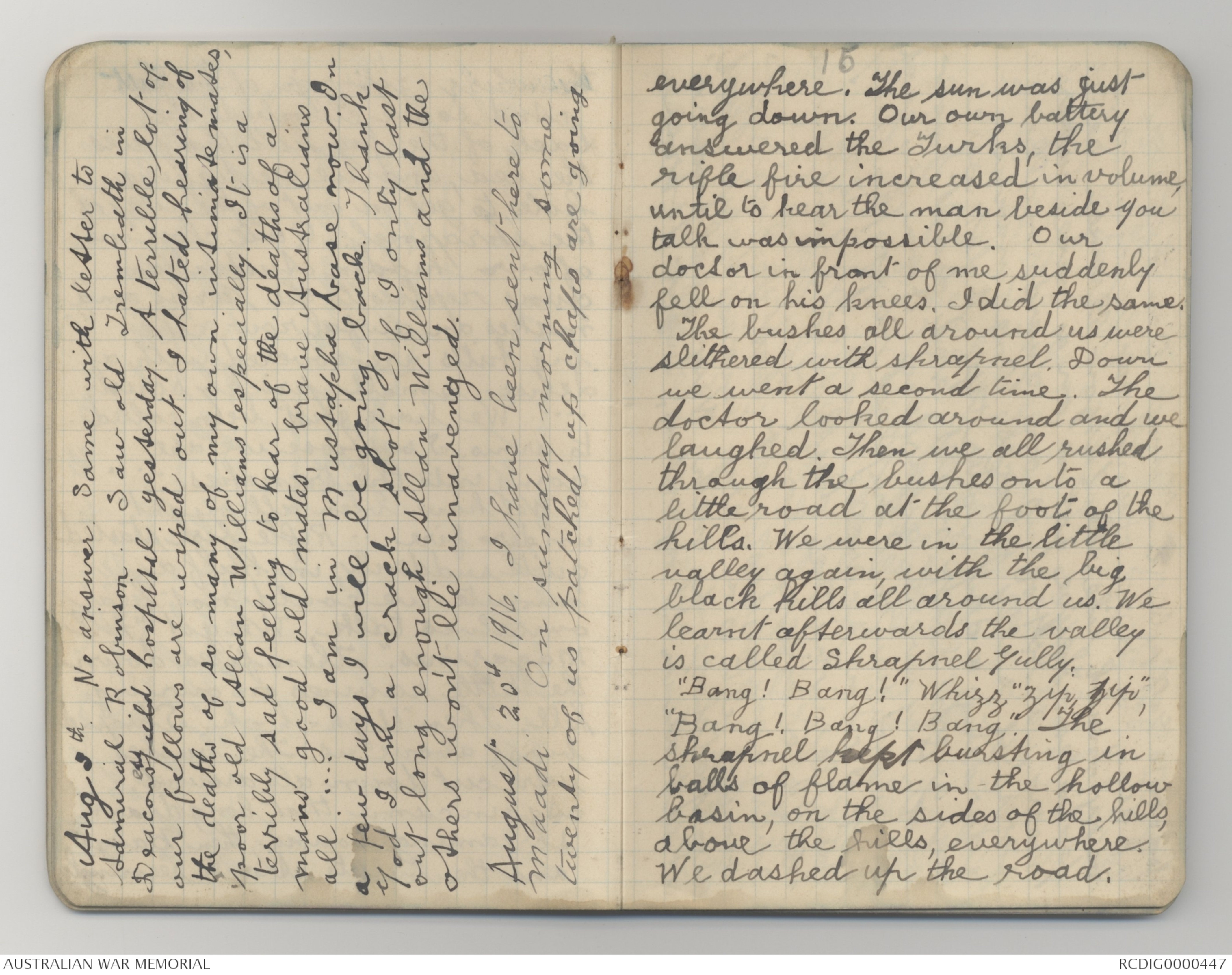
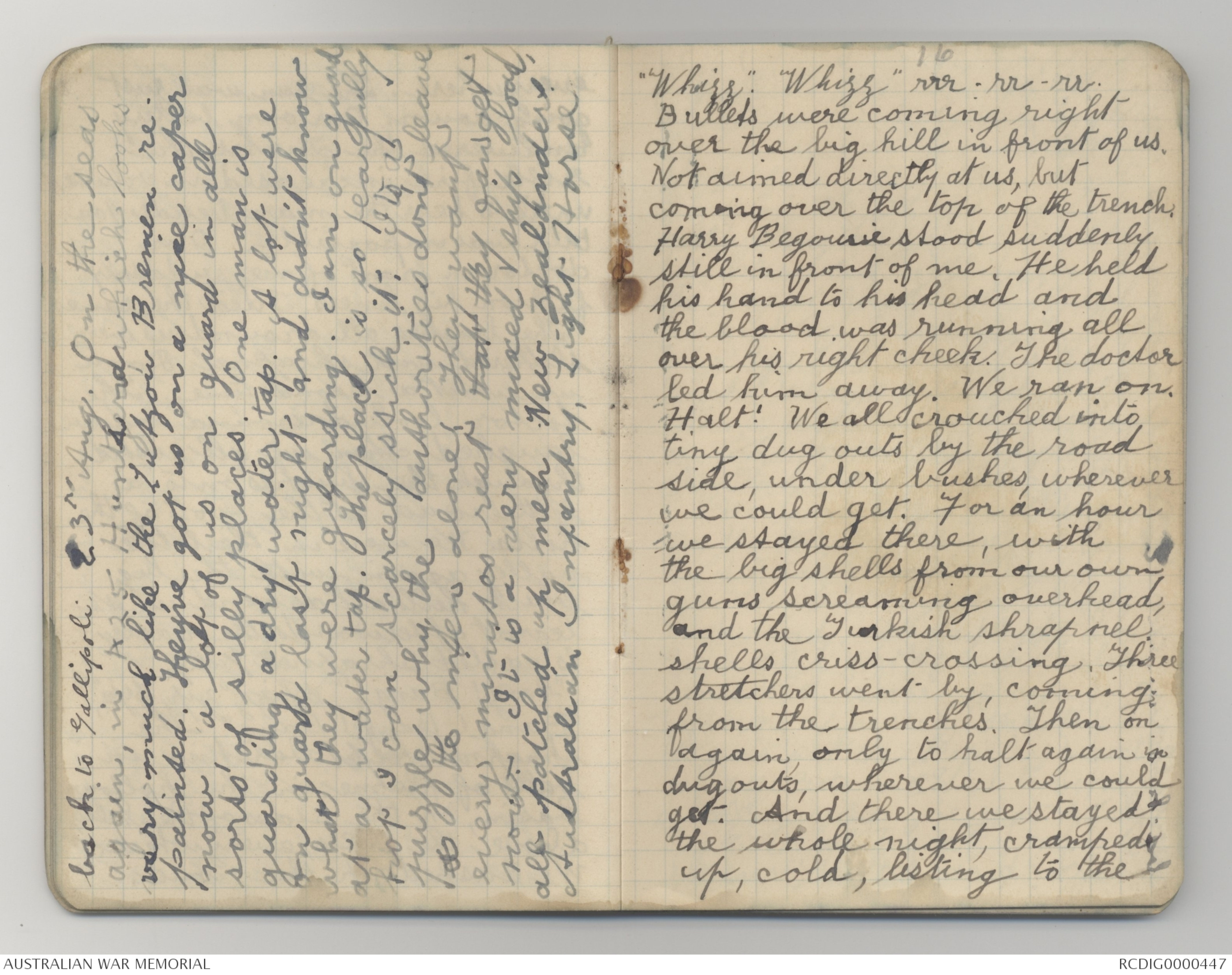
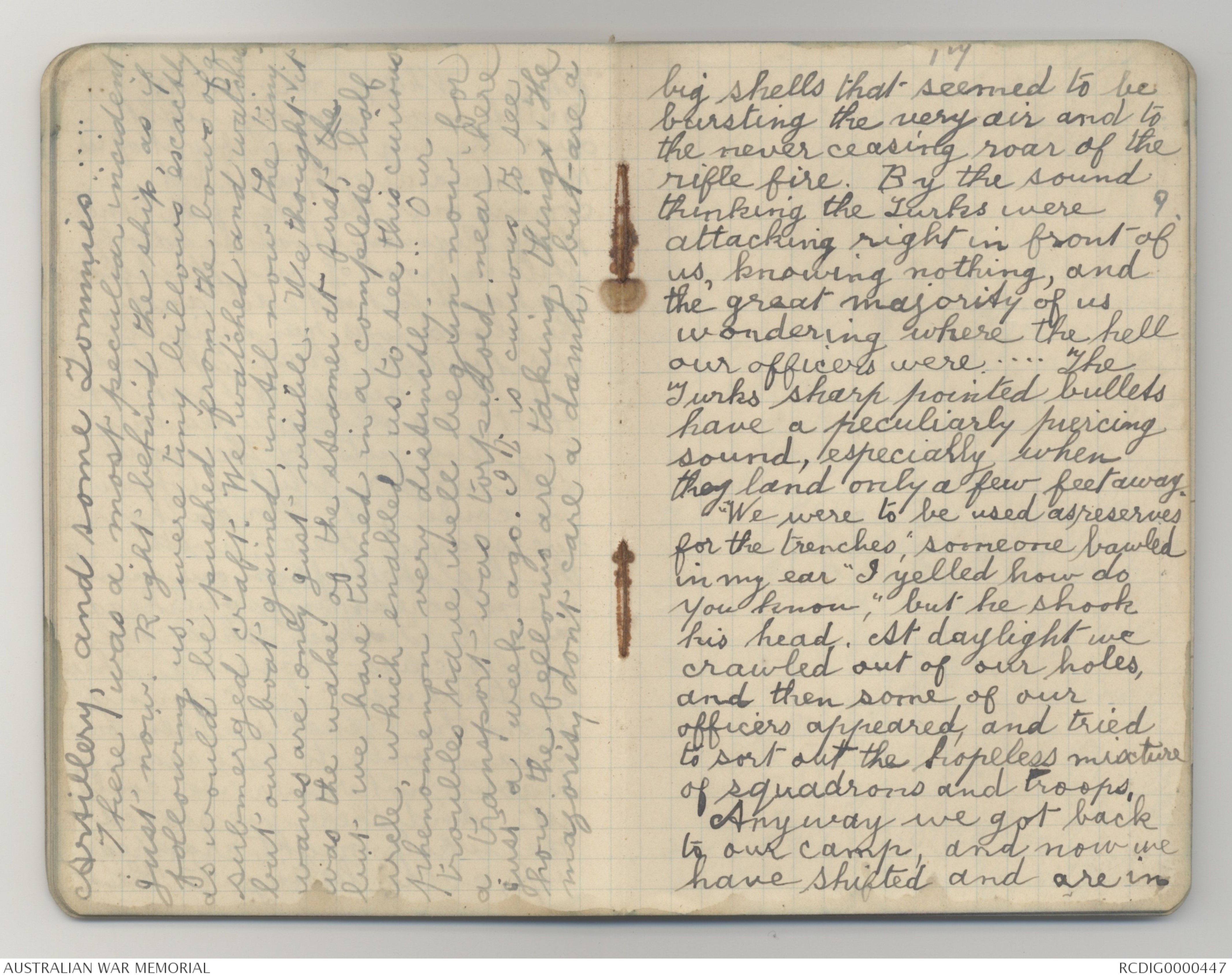
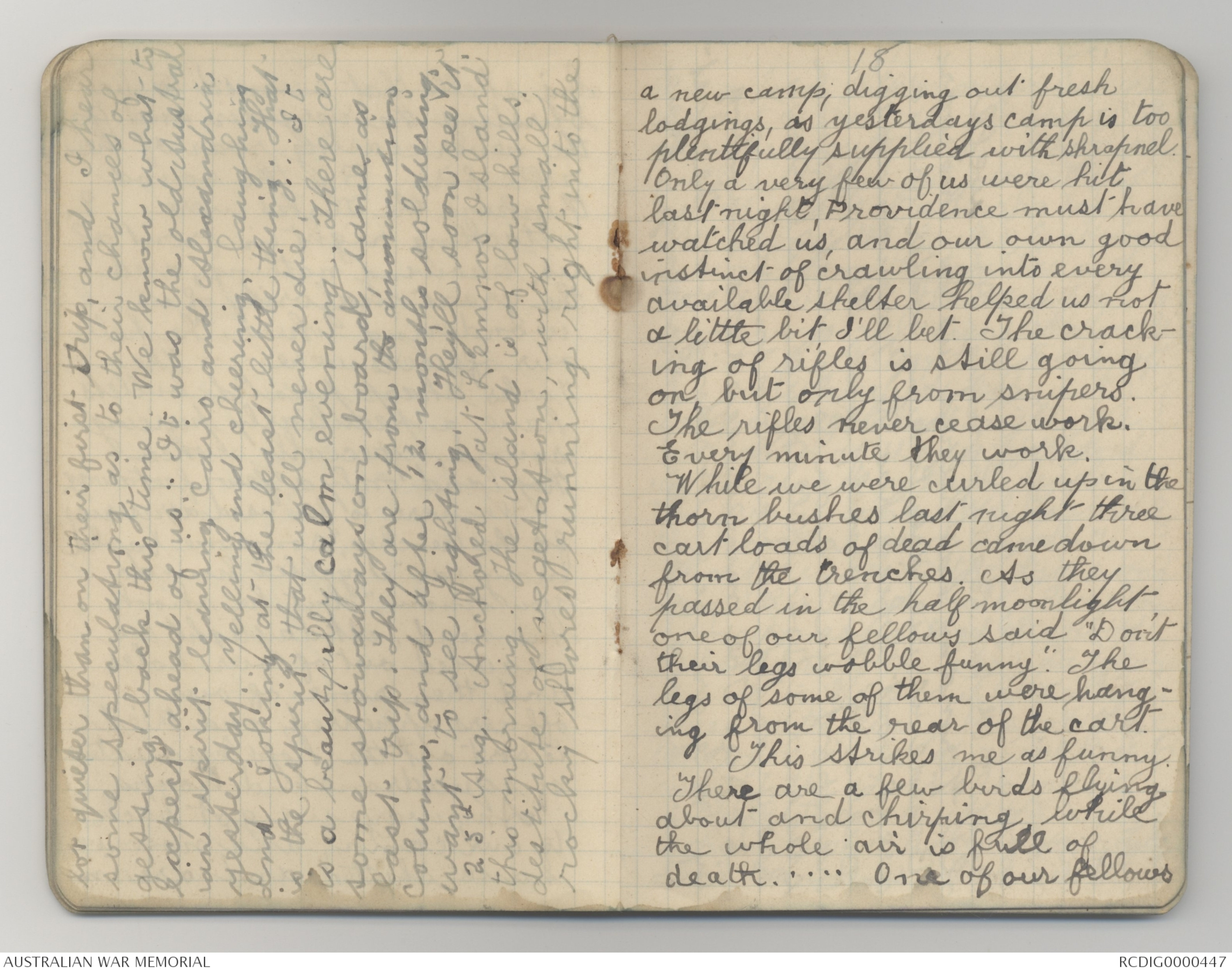
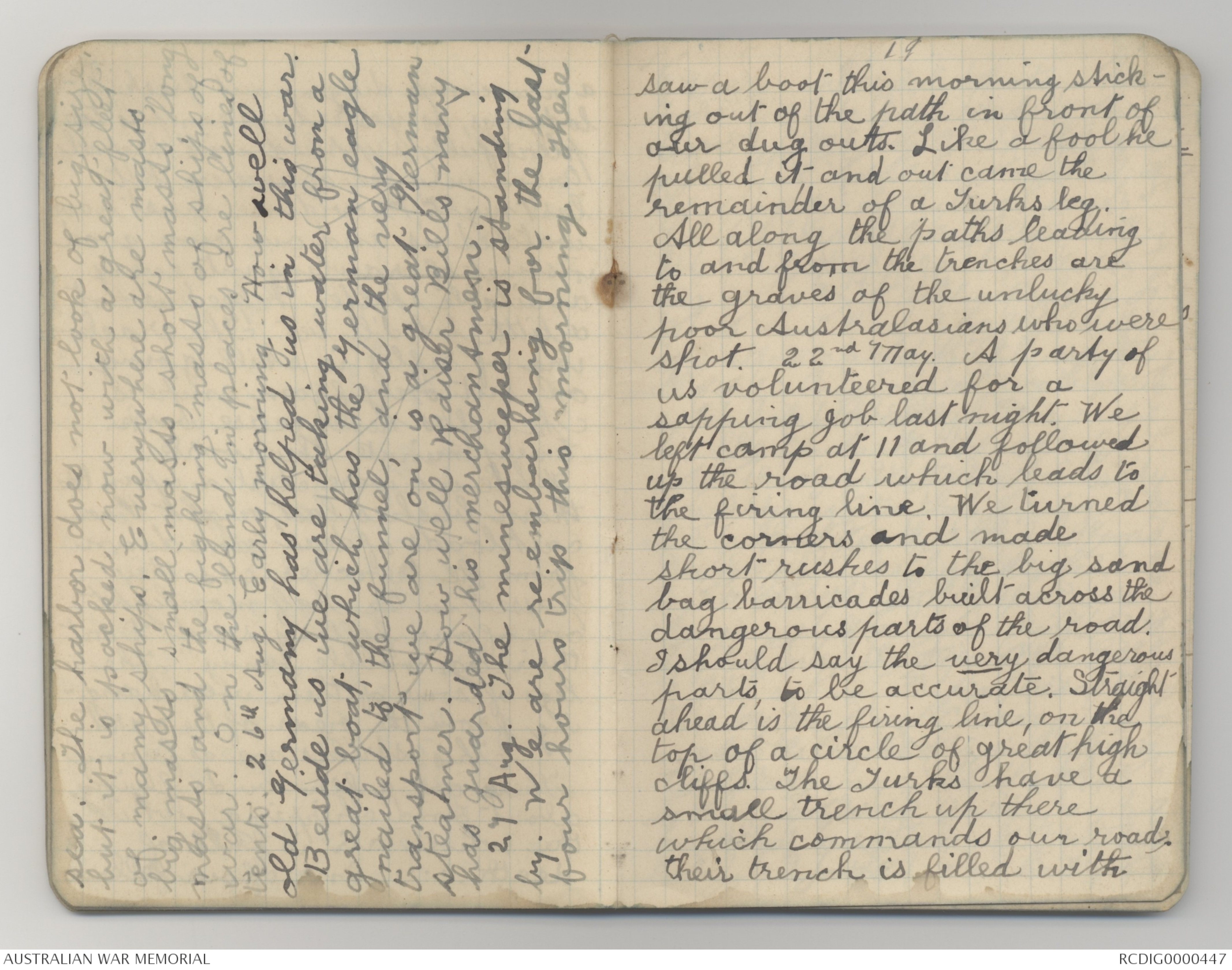
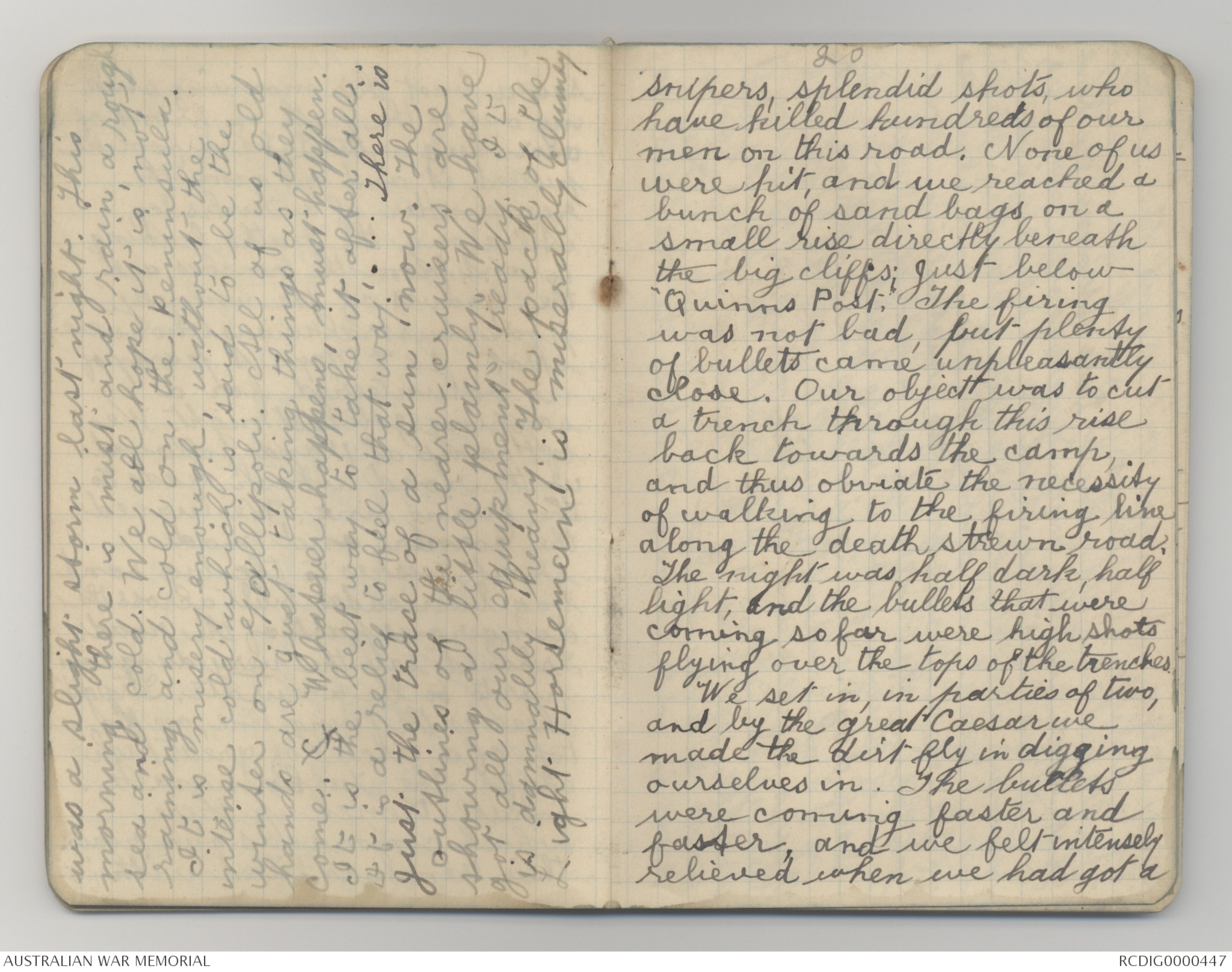
old iron. This pipe does not move, except
forward as the drill burrows into the
ground.
B. Smaller inside pipe to the end of which
is attached the face of the drill.
C. Rod, which is attached by pinion D.
and E to the pipe B. It is this rod which
is jerked backwards and forwards, which
turns the pipe B half sideways, then reverse,
etc. This same motion turns the drill
head F, attached to the pipe D, sharply in
a half left, then half right motion.
This causes the sharp teeth G to grind
into the earth.
The same movement, coupled with
the pressure of the pipes, forces the ground
up earth to go through the opening H and up
11
them now are the shrapnel
clouds, and a little higher
and to the right, a scouting
biplane. The cruisers a little
further to the right are kicking
up a devil of a row. . . .
We are landing after all. The
boat is already alongside.‥‥
Our turn came and we
packed tightly into every
spare space on the little steamers
deck. Nothing happened until
we got close inshore. Then
"Whizz" - ping - whizz, a
few stray bullets. We all
opened our eyes, two or three
laughed, then the lot laughed.
After that we listened for the
"whizz" and laughed as
the bullet would strike the
funnel, or enter the water
close by. The boat cast
anchor, and two small
launches came and took two
loads of us to the tiny beach,
when the captain yelled
to get down below, as the
the pipe B. Water can be used to keep the loose
earth compact.
I is the pipe which fits on the end of the
first pipe, and so on, back to the trench,
where a small motor would have to be to
drive the rod C which turns the drill.
With such a comparatively rude apparatus,
I believe the soft ground between the
trenches could be bored for these mines
very quickly indeed.
As for inserting the mine, should it be a
shell, on rather in the shape of a shell,
when the machine had bored to the
required distance the pipes would be
pulled out, the mine being inserted in a
length of the big piping, which would in
turn be but slightly screwed to the
12
shrapnel would soon come.
He hardly finished speaking
when there came a
tearing shrieking sound
and "Bang!" Bullets burst on
the water and clattered on
the side of the boat. How we
tumbled down below. Then
came another, and we
yelled with laughter, calling
out to the far away Turks
where to shoot. But they sent
seven well aimed shots
shells around us, and the
captain up anchored quickly
and cleared out. We
anchored again, and
finally landed among huge
stacks of ammunition and
stores. Men were bathing,
men were working
among the heavy stacks
of munitions, men were
every where on the tiny beach,
in ragged, toil stained
uniforms, their wholesome
Australian faces mostly
beginning of the pipes.
This first length of piping would have
to be sacrificed, but if the inside were sealed
up, and the inside filled with gun cotton
or whatever mine material is, then the
pipe would materially help the real mine.
The line of pipes could then be unscrewed
and pulled out of the hole. The mine could
be fired by fuse.
The correct distances and objectives could
easily be observed from the surface before
the machine was adjusted for work.
Such, Sir, is my idea, and a very
blunderbus's sort of idea I admit it is.
But if anything was thought of it, and
the idea given to an engineer, he would
13
with half beards. Everywhere
up the steep hillside were
dozens of dug outs, many like
tiny kennels. A few Indian
soldiers were roading ammunition
on mules. The men have
cut zig-zag tracks out of the
big hill-side. Close inshore
were a couple of overturned
boats, relics of the day when
the Australians took the
rugged hill. We climbed
up the steep path laughing
and joking with the ^toil stained
warriors cooking their evening
meal, toiling on the ammunition,
and lying about their
tiny dug outs. Then through
a trench to the back of the
hill. We were in a narrow
valley in a sort of basin, with
big hills all around In
front the long big hill with
our trenches on it, behind the
hill facing the sea. An
occasional shrapnel
screaming over head, and
very soon rig up a the machine to give
practical results.
If it would turn out to be the success
I think it has a chance to be then there
would be another feather for Australia's
hat. If it's all rot, it can't be helped.
I remain,
Your's Respectfully
Trooper I L Idress
5th Light-Horse
2nd Brigade
I am having this posted to-day. I wonder
if I will ever get an answer?
14
the whizz - zip - zip, of bullets.
And so we climbed the
back of the big hill that faces
the sea, and we are digging
holes to get in out of the way of
the shrapnel. Quite close one
of our hidden Australian
guns replies to the Turks and
makes an awful row. The
big hills are covered with a
dense, small prickly scrub.
. . . . We have just been called
to arms. I suppose we are
going into the trenches.. . . .
We have been all night
under fire. . . Rifle fire started
quite suddenly, in half a
minute we could not hear
ourselves talk, We got "Fill
Magazines". Then filed down
the little ravines on our big
hill. Then "Ugh-h-h." Shrapnel
burst above us. The bushes
were cut down all around.
Again came that long drawn
screaming sound, then "Bang"
and the bullets struck seemingly
Aug 5th No answer. Same with letter to
Admiral Robinson. Saw old Trembath in
Deaconsfield hospital yesterday. A terrible lot of
our fellows are wiped out. I hated hearing of
the deaths of so many of my own intimate mates,
poor old Allan Williams especially. It is a
terribly sad feeling to hear of the deaths of a
mans good old mates, brave Australians
all. . . . I am in Mustafeha base now. In
a few days I will be going back. Thank
God I am a crack shot. If I only last
out long enough Allan Williams and the
others won't lie unavenged.
August 20th 1916. I have been sent here to
Maadi On Sunday morning some
twenty of us patched up chaps are going
15
everywhere. The sun was just
going down. Our own battery
answered the Turks, the
rifle fire increased in volume,
until to hear the man beside you
talk was impossible. Our
doctor in front of me suddenly
fell on his knees. I did the same.
The bushes all round us were
slithered with shrapnel. Down
we went a second time. The
doctor looked around and we
laughed. Then we all rushed
through the bushes onto a
little road at the foot of the
hills. We were in the little
valley again, with the big
black hills all around us. We
learnt afterwards the valley
is called Shrapnel Gully.
"Bang! Bang!" Whizz "zip zip",
"Bang! Bang! Bang". The
shrapnel kept bursting in
balls of flame in the hollow
basin, on the sides of the hills,
above the hills, everywhere.
We dashed up the road.
back to Gallipoli 23rd Aug. On the seas
again, in A25 Huntsend which looks
very much like the Lutzow Bremen repainted.
They've got us on a nice caper
now, a lot of us on guard in all
sorts of silly places. One man is
guarding a dry water tap. A lot were
on guard last night and didn't know
what they were guarding. I am on guard
at a water tap. The place is so fearfully
hot I can scarcely stick it. It's a
puzzle why the authorities don't leavea the men alone. They want
every minutes rest that they can get
now. It is a very mixed ship load,
all patched up men New Zealanders
Australian Infantry, Light Horse
16
"Whizz" "Whizz" rrr -rr-rr.
Bullets were coming right
over the big hill in front of us.
Not Aimed directly at us, but
coming over the top of the trench.
Harry Begourie stood suddenly
still in front of me. He held
his hand to his head and
the blood was running all
over his right check. The doctor
led him away. We ran on.
Halt! We all crouched into
tiny dug outs by the road
side, under bushes, wherever
we could get. For an hour
we stayed there, with
the big shells from our own
guns screaming overhead,
and the Turkish shrapnel.
shells criss-crossing. Three
stretchers went by, coming
from the trenches. Then on
again, only to halt again in
dugouts, wherever we could
get. And there we stayed
the whole night, cramped
up, cold, listing to the
Artillery, and some Tommies....
There was a most peculiar incident
just now. Right behind the ship, as if
following us, were tiny billows exactly
as would be pushed from the bows of a
submerged craft. We watched and watched
but our boat gained, until now the tiny
waves are only just visible. We thought it
was the wake of the steamer at first, the
but we have turned in a complete half
circle, which enabled us to see this curious
phenomenon very distinctly. . .Our
troubles have well begun now, for
a transport was torpedoed near here
just a week ago. It is curious to see
how the fellows are taking things. The
majority don't care a damn, but are a
17
big shells that seemed to be
bursting the very air and to
the never ceasing roar of the
rifle fire. By the sound
thinking the Turks were
attacking right in front of
us, knowing nothing, and
the great majority of us
wondering where the hell
our officers were. . . . The
Turks sharp pointed bullets
have a peculiarly piercing
sound, especially when
they land only a few feet away.
"We were to be used as reserves
for the trenches," someone bawled
in my ear "I yelled how do
you know," but he shook
his head. At daylight we
crawled out of our holes,
and then some of our
officers appeared and tried
to sort out the hopeless mixture
of squadrons and troops.
Anyway we got back
to our camp, and now we
have shifted and are in
lot quieter than their first trip, and I hear
some speculating as to their chances of
getting back this time. We know what to
expect ahead of us... It was the old Australian
spirit leaving Cairo and Alexandria
yesterday. Yelling and cheering, laughing
and joking at the least little thing. That
is the spirit that will never die. . . . It
is a beautifully calm evening. There are
some stowaways on board same as
last trip. They are from the ammunitions
column, and after 12 months soldiering
want to see fighting. They'll soon see it.
25th Aug. Anchored at Lemnos Island
this morning. The island is of low hills,
destitute of vegetation, with small
rocky shores running right into the
18
a new camp, digging out fresh
lodgings, as yesterdays camp is too
plentifully supplied with shrapnel.
Only a very few of us were hit
last night, Providence must have
watched us, and our own good
instinct of crawling into every
available shelter helped us not
a little bit, I'll bet. The cracking
of rifles is still going
on but only from snipers.
The rifles never cease work.
Every minute they work.
While we were curled up in the
thorn bushes last night three
cart loads of dead came down
from the trenches. As they
passed in the half moonlight
one of our fellows said "Don't
their legs wobble funny". The
legs of some of them were hanging
from the rear of the cart.
This strikes me as funny.
There are a few birds flying
about and chirping, while
the whole air is full of
death. . . . One of our fellows
sea. The harbor does not look of big size
but it is packed now with a great fleet
of many ships. Everywhere are masts,
big masts small masts, short masts, long
masts, and fighting masts of ships of
war. On the land in places are lines of
tents. 26th Aug. Early morning. How well
old Germany has helped us in this war.
Besides us we are taking water from a
great boat, which has the German eagle
nailed to the funnel, and the very
transport we are on is a great German
steamer. How well Kaiser Bills navy
has guarded his merchantmen.
27 Aug. The minesweeper is standing
by. We are re embarking for the last
four hours trip this morning. There
19
saw a boot this morning sticking
out of the path in front of
our dug outs. Like a fool he
pulled it and out came the
remainder of a Turks leg.
All along the paths leading
to and from the trenches are
the graves of the unlucky
poor Australasians who were
shot. 22nd May. A party of
us volunteered for a
sapping job last night. We
left camp at 11 and followed
up the road which leads to
the firing line. We turned
the corners and made
short rushes to the big sand
bag barricades built across the
dangerous parts of the road.
I should say the very dangerous
parts, to be accurate. Straight
ahead is the firing line, on the
top of a circle of great high
cliffs. The Turks have a
small trench up there
which commands our road.
their trench is filled with
was a slight storm last night. This
morning there is mist and rain, a rough
sea and cold. We all hope it is not
raining and cold on the Peninsula.
It is misery enough, without the
intense cold which is said to be the
winter on Gallipoli. All of us old
hands are just taking things as they
come. C Whatever happens, must happen.
It is the best way to take it, after all.
It is a relief to feel that way. . . . There is
just the trace of a sun now. The
outlines of the nearer cruisers are
showing a little plainly. We have
got all our equipment ready. It
is damnably heavy. The pack of the
Light Horseman is miserably clumsy
20
snipers, splendid shots, who
have killed hundreds of our
men on this road. None of us
were hit, and we reached a
bunch of sand bags on a
small rise directly beneath
the big cliffs; just below
'Quinns Post.' The firing
was not bad, but plenty
of bullets came unpleasantly
close. Our object was to cut
a trench through this rise
back towards the camp,
and thus obviate the necessity
of walking to the firing line
along the death strewn road.
The night was half dark, half
light, and the bullets that were
coming so far were high shots
flying over the tops of the trenches.
We set in, in parties of two,
and by the great Caesar we
made the dirt fly in digging
ourselves in. The bullets
were coming faster and
faster, and we felt intensely
relieved when we had got a
 Diane Ware
Diane WareThis transcription item is now locked to you for editing. To release the lock either Save your changes or Cancel.
This lock will be automatically released after 60 minutes of inactivity.